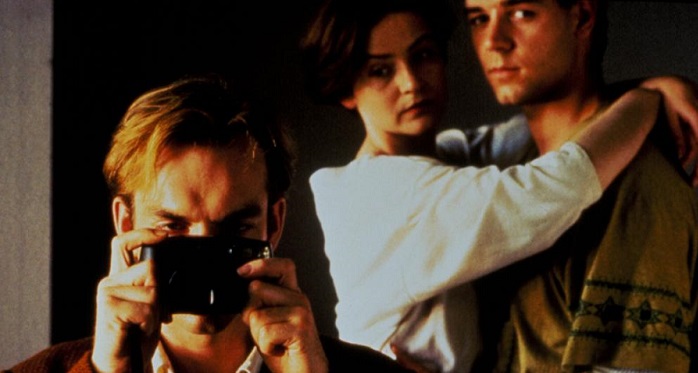Jocelyn Moorhouse
26. Proof, directed by
Jocelyn Moorhouse
When A Picture Can’t Be A Thousand Words In Proof
Admittedly coming from a biased viewpoint, it seems to me that Australian films are often distinctly risk-taking. They encourage full viewer participation, by leaving a few dots for us to connect ourselves. Put plainly, they serve a meal without chewing it for us. Moorhouse’s Proof is an un-chewed meal, defined by a certain kind of peculiar brilliance.
Martin (Hugo Weaving) is a blind man, and ironically too, a compulsive photographer. Frame by frame, he documents his surroundings and his day, which then stacks up to be his week, and cumulatively, his life. After Martin meets Andy (a young and mesmerising Russell Crowe), Martin’s ‘hobby’ is revealed to have a darker edge.
Each photo is a piece of evidence, or more specifically, a measure to prove that his reality matches that of those around him. If he cannot see it, how can be believe it? Thus, by taking pictures in the moment, and having people describe these photos to him, Martin can be certain that what he thinks he knows, whether this relates to an environment or situation, is to be trusted. He then prints a short description of the picture with a braille label maker, which he sticks on the back.

This mistrust, or rather wariness of the world around him, extends to people. He judges characters, especially his housekeeper Celia (Genevieve Picot), whom he assumes is plain and dumpy. Theirs is a relationship of love-hate; an unreciprocated obsession and a mutual contempt. When Martin meets Andy, they establish a friendship that begins to crack Martin’s fierce suspicion.
Weaving together drama and humour, the result is an affecting black comedy, firmly rooted in quirk. The characters are at times acidic, at other moments tender, each with vulnerabilities that eventually come to the fore. Sticking mainly to a tight trio, we explore their individual complexities and how these dynamics come together in ways that are complementary, and more often than not, instable.
There is a distinctly claustrophobic feel to Proof, imparted primarily through the limited characters and settings. However, this atmosphere is purposeful, stifling us with the mundane nature of daily routine. It speaks also of Martin’s life as a blind man, bound by habit, limited, and entrenched in a reality that is as comfortable as it is soul-destroying. His life is insular, purposefully confined to specific interactions and places. As the film goes on, we realise that such a limited existence arises only from the limits of his perspective, not his disability. Closing himself off to the world is a self-motivated choice, and one that creates his greatest sense of isolation.

You can sense visually that this is a micro-budget film, but not in a negative way at all. Instead the lighting, for example, feels accurate in its realism and even dinginess at times, giving off a gritty flavour, particularly when indoors. Once again, it emphasises a life clouded by cynicism and doubt, and of imperfection.
Proof became something of a cult-hit, suggesting that audiences are enticed by unique and thought-provoking stories. Not short and sweet, but rather short and sharp, it pushes the boundaries of traditional genre, tensely making us think, and darkly chuckle. Thriller, drama, comedy, it doesn’t really matter – it’s captivating and asks questions of its audience: what shapes us, what drives us, what unites us and to what degree should we trust blindly? Now that, my friends, is the sign of a damn good film.
One Reply to “26. Proof, directed by
Jocelyn Moorhouse”